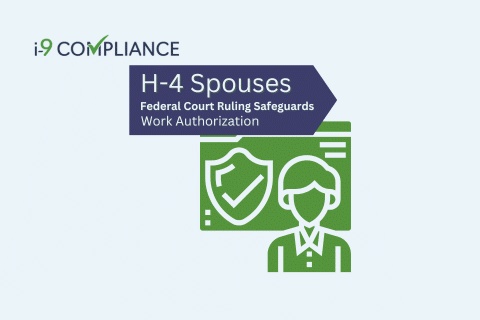Federal Court Ruling Safeguards Work Authorization for H-4 Spouses

May 8, 2023
The U.S. District Court for the District of Columbia recently announced a ruling that benefits H-4 spouses. This ruling provided greater certainty and protection for H-4 spouses’ ability to gain work authorization. For example, H-4 spouses of H-1B visa holders will continue to receive work authorization to seek employment within the U.S.
This ruling occurred after a lawsuit challenged the Department of Homeland Security’s (DHS) practice concerning employment authorization applications. According to the suit, the DHS allowed H-4 visa holders to apply for employment authorization under certain circumstances. The plaintiffs claimed this practice lacked statutory authority from Congress, that it “violates the nondelegation doctrine, and is arbitrary and capricious.” They further alleged that the DHS failed to consider how this practice could harm U.S. workers for similar reasons.
The rule the plaintiffs challenged allows H-4 visa holders eligible to apply for Employment Authorization Documents under specific circumstances. These circumstances included having H-1B spouses transitioning to lawful permanent resident status through an extension granted by the American Competitiveness in the Twenty-First Century Act of 2002. Another example involves an H-1B spouse under a Form I-140 petition but unable to adjust their status due to visa oversubscription.
This regulation intended to eliminate any potential hindrance or discouragement for H-1B workers who want to stay in the United States. When originally introduced, standard notice and comment procedures applied to the rule.
In challenging the regulation, the plaintiff’s primary argument asserted that Congress never authorized the DHS to grant H-4 visa holders work authorization. However, the court rejected this argument. Instead, the court found that “the INA’s explicit grant of authority to the Department… commands DHS to ‘establish such regulations’ as its Secretary ‘deems necessary for carrying out his authority.'” Furthermore, the court insisted that it “specifically provides that the ‘admission to the United States of any alien as a nonimmigrant shall be for such time and under such conditions as the Attorney General may by regulations prescribe.'”
The Secretary of the DHS later received the delegation of this authority. Reaffirming this interpretation, the court noted that Congress refused to overturn similar administrative constructions the DHS used to grant F-1 students employment authorization. Instead, Congress expanded upon it by creating tax exemptions for these students.
Similarly, the court rejected the concept that the DHS had failed to consider the negative effect that this rule could have on U.S. workers. Under the DHS’s calculation, if every eligible spouse acquired employment authorization, this would still number less than 0.12% of the U.S. workforce. This calculation proved it would have a negligible effect on U.S. workers. As the plaintiff failed to counter this argument with empirical data, the court found that the rule’s benefits outweighed any potential harm it may have.
These findings allowed the court to grant summary judgment. As a result, the court allowed the DHS to continue working under its current policy, benefitting H-4 spouses wishing to maintain their work authorization. However, this decision also means employers must continue preparing and completing these workers’ employment eligibility verification (Form I-9) process. The best way to ensure I-9 compliance is to use an electronic I-9 management tool with E-verify integration. This tool can provide all the tools needed to help ensure uniform compliance.
Ensure compliance today by switching to an electronic I-9 management tool with I-9Compliance.